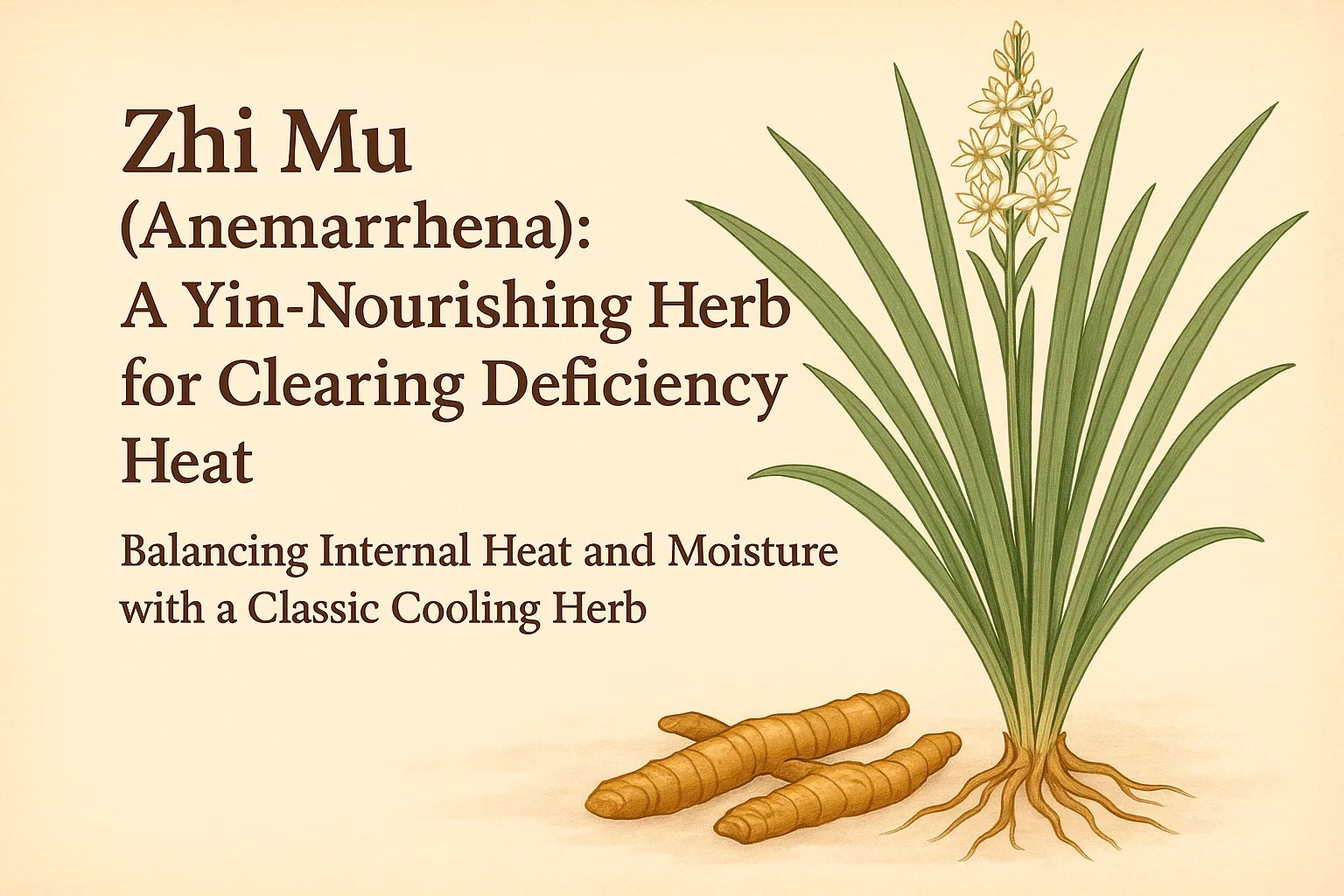Balancing Internal Heat and Moisture with a Classic Cooling Herb
🔶 Introduction
Zhi Mu (知母), the rhizome of Anemarrhena asphodeloides, is a valuable herb in Traditional Chinese Medicine (TCM) known for its bitter-cold nature and dual capacity to clear Heat and nourish Yin. It is particularly useful in cases where Yin deficiency leads to internal Heat, a pattern frequently seen in menopausal syndromes, chronic infections, night sweats, and low-grade fevers.
Unlike many other cooling herbs that can be overly draining, Zhi Mu not only cools but also moistens, making it especially beneficial for dryness-related conditions. This article explores Zhi Mu’s TCM properties, common clinical applications, synergistic herbal combinations, and its modern pharmacological insights.
🔶 TCM Properties of Zhi Mu
| Category | Herbs that clear Heat and drain Fire |
|---|---|
| Nature | Cold |
| Flavor | Bitter, Sweet |
| Meridians entered | Lung, Stomach, Kidney |
Key Actions in TCM:
- Clears Heat and drains Fire – Especially from the Lung and Stomach.
- Nourishes Yin and moistens Dryness – Especially for Lung and Kidney Yin deficiency.
- Generates fluids – Useful in conditions of Yin depletion with thirst or dryness.
- Relieves irritability – Due to Heat consuming fluids.
🔶 Clinical Applications of Zhi Mu
Zhi Mu is often prescribed in conditions where excessive internal Heat arises from Yin deficiency, or where Lung and Stomach Fire causes dryness and inflammation.
✅ 1. Yin Deficiency Heat
- Symptoms: Night sweats, five-center heat (palms, soles, chest), dry mouth, insomnia.
- Paired with: Sheng Di Huang, Mai Men Dong, Huang Bai (e.g., Zhi Bai Di Huang Wan).
- Pattern: Kidney Yin deficiency with Heat signs.
✅ 2. Lung Heat and Dryness
- Symptoms: Dry cough, yellow phlegm, sore throat, thirst.
- Paired with: Shi Gao, Xing Ren, Sang Bai Pi (e.g., Ma Xing Shi Gan Tang).
- Pattern: Heat in the Lung, often with dryness or phlegm-Heat.
✅ 3. Stomach Fire
- Symptoms: Excess hunger, acid reflux, swollen gums, constipation.
- Paired with: Huang Lian, Shi Gao, Lu Gen.
- Pattern: Stomach Heat damaging Yin and fluids.
✅ 4. Menopause-related Symptoms
- Symptoms: Hot flashes, night sweats, dry mouth, irritability.
- Often combined with: Zhi Bai Di Huang Wan or Liu Wei Di Huang Wan plus Heat-clearing herbs.
🔶 Representative Formulas Containing Zhi Mu
| Formula Name | Indications |
|---|---|
| Zhi Bai Di Huang Wan | Kidney Yin deficiency with Heat signs (menopause, night sweats) |
| Bai Hu Tang | Four-big symptoms (big thirst, big sweat, big fever, big pulse) |
| Yu Nu Jian | Stomach Heat with Yin deficiency, toothache, dry mouth |
| Mai Men Dong Tang | Lung Yin deficiency, dry cough, irritability |
Zhi Mu is frequently paired with Shi Gao (Gypsum) for stronger Fire-clearing effect, or with Yin-nourishing herbs to maintain fluid balance.
🔶 Pharmacological Research
Modern studies have revealed that Zhi Mu contains several bioactive components, including timosaponins, mangiferin, and anemaran, which contribute to its medicinal effects.
✅ Anti-inflammatory and Antipyretic
- Reduces inflammatory markers in fever and immune disorders.
✅ Antioxidant and Neuroprotective
- Protects against oxidative stress, potentially beneficial in neurodegenerative conditions.
✅ Hypoglycemic Effects
- Regulates blood sugar and may be useful in diabetes-related Yin deficiency.
✅ Hormonal Regulation
- Some studies suggest it modulates estrogen pathways, supporting its use in menopause.
🔶 Usage and Dosage
✅ Typical Dosage:
- Decoction: 6–12 grams
- Used in combination with other herbs to moderate coldness or enhance Yin support
⚠️ Cautions:
- Not suitable for Spleen-Stomach Cold deficiency.
- Avoid in patients with loose stools, cold extremities, or Yang collapse.
- Use with caution during pregnancy and in very weak constitutions.
🔶 Conclusion
Zhi Mu is a cooling yet nourishing herb that offers powerful support for Heat-clearing, Yin tonification, and moisture restoration. Its balanced action makes it ideal for treating a wide range of internal Heat conditions, especially those rooted in Yin deficiency. Whether used for menopausal symptoms, dry coughs, or digestive Fire, Zhi Mu remains a cornerstone herb in TCM’s strategy to restore balance between Fire and Water.


发表回复